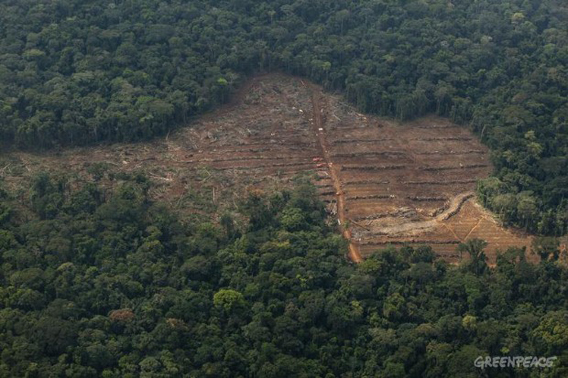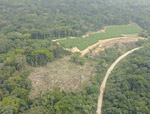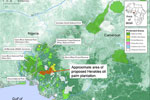
Clearing of trees in a concession area of Herakles Farm’s area for a palm oil plantation. Greenpeace says these clearings are illegal since Herakles’ lease has not been given final approval. Herakles Farm did not respond to request for comment. Photo: © Greenpeace/Alex Yallop.
Newly released photos by Greenpeace show the dramatic destruction of tropical forest in Cameroon for an oil palm plantation operated by SG Sustainable Oils Cameroon (SGSOC), a subsidiary of the U.S. company Herakles Farm. The agriculture company is planning to convert 73,000 hectares to palm oil plantations on the edge of several protected areas, but has faced considerable opposition from environmentalists. In addition to the aerial photos, Greenpeace alleges that ongoing forest clearing by Herakles is illegal since the companies 99-year lease has yet to be fully approved by the Cameroonian government.
“Any large scale industrial projects in an area that is one of the most important watersheds in sub-Saharan Africa and located in one of Africa’s most important biodiversity hotspots are entirely unsuitable,” said Frédéric Amiel, a forest campaigner with Greenpeace International in a press release.
The plantation is set in the midst of four protected areas, including Korup National Park, which is home to around 200 reptile and amphibian species, 400 bird species, and 160 species of mammals, including one of the most diverse assemblages of primates ever discovered. Its location prompted a letter last year from 80 civil service groups raising concerns about the impacts on forests, migrating species, and local people.
In response to the letter and other criticisms, Herakles Farms promised it would abide by strict environmental and social standards. The CEO, Bruce Wrobel, went so far as to call his team “environmentalists.” However the project has since become mired in controversy as local communities began to protest the project and the company announced it was pulling out of the Roundtable on Sustainable Palm Oil (RSPO), which sets the basic environmental standards for the industry. Most recently the head of an NGO actively opposing the plantation, Nasako Besingi, was arrested along with three others by national police. They were released four days later after local communities sported bail.
One of the more unusual twists in this story is that Herakles Farms is handing over some 17,000 acres to All for Africa, a charity that is also run by Bruce Wrobel, the CEO of Herakles Farms. As a part of its “Palm Out Poverty” campaign the proceeds from this plantation will go to funding community development projects around Africa. On its website, All for Africa’s ask donors to fund palm oil trees, but neglects to mention that the “sustainable” plantation is at the expense of tropical forest and opposed by some communities.
The website even states that its palm oil trees will “absorb more than 28,000,000 pounds of carbon dioxide every single year.” However, since the plantation comes at the expense of natural forests, it will actually release carbon into the atmosphere. All for Africa said it would remove this language from its website a year ago.
Greenpeace has called on the Cameroon government to cancel the project and set up new standards for land and palm oil in the country.
“The Herakles Farms plantation must be stopped with no conditions,” Amiel concluded.
Herakles Farms did not respond to request for comment, but in the past has asserted that it will not covert high conservation forest. The company says the project will bring jobs and other livelihoods to the region.

Oil palm nursery in a Herakles Farm’s concession area. Last year Herakles Farms said it had permission to set up three nurseries covering 100 hectares even before producing a Social and Environmental Impact Assessment (SEIA). Photo: © Greenpeace/Alex Yallop.

Rainforest in the concession area. In the past, Herakles stated it would not clear High Conservation Value Forest (HCVF). Photo: © Greenpeace/Alex Yallop.

Construction equipment in forest cleared by Herakles Farms. Photo: © Greenpeace/Alex Yallop.

Forest and river in Herakles’ concession area. Photo: © Greenpeace/Alex Yallop.
An open letter from Bruce Wrobel
Related articles
Activists protesting controversial Cameroon palm plantation arrested
(11/17/2012) Activists protesting conversion of rainforest to an oil palm plantation have been arrested in Cameroon, reports Greenpeace.
Palm oil company in Cameroon drops bid for eco-certification of controversial plantation
(09/05/2012) Herakles Farm, a U.S.-based agricultural developer, will no longer seek eco-certification of its 70,000-hectare oil palm plantation in Cameroon, reports the Roundtable on Sustainable Palm Oil (RSPO). The move comes amid criticism from environmental groups that Herakles is converting high conservation value rainforest for the plantation.
Scientists say massive palm oil plantation will “cut the heart out” of Cameroon’s rainforest

(03/15/2012) Eleven top scientists have slammed a proposed palm oil plantation in a Cameroonian rainforest surrounded by five protected areas. In an open letter, the researchers allege that Herakles Farm, which proposes the 70,000 hectare plantation in southwest Cameroon, has misled the government about the state of the forest to be cleared and has violated rules set by the Roundtable on Sustainable Palm Oil (RSPO), of which it’s a member. The scientists, many of whom are considered leaders in their field, argue that the plantation will destroy rich forests, imperil endangered species, and sow conflict with local people.
Palm oil, poverty, and conservation collide in Cameroon

(09/13/2011) Industrial palm oil production is coming to Africa, its ancestral home. And like other places where expansion has occurred rapidly, the crop is spurring hope for economic development while generating controversy over its potential impacts. The world’s most productive oil seed has been a boon to southeast Asian economies, but the looming arrival of industrial plantations in Africa is raising fears that some of the same detriments that have plagued leading producers Malaysia and Indonesia—deforestation, greenhouse gas emissions, biodiversity loss, conflicts with local people, social displacement, and poor working conditions—could befall one of the world’s most destitute regions. While there is no question that oil palm is a highly lucrative crop that can contribute to economic development, there is also little doubt that conversion of native forests for plantations exacts a heavy toll on the environment. The apparent conflict seems to pit agroindustrial goliaths against greens, with communities falling somewhere in between. But Herakles, a New York-based investment firm planning to construct a 60,000-hectare plantation in the Central African country of Cameroon, says its approach will bridge this gap between economic development and the environment. Social and environmental campaigners are skeptical.